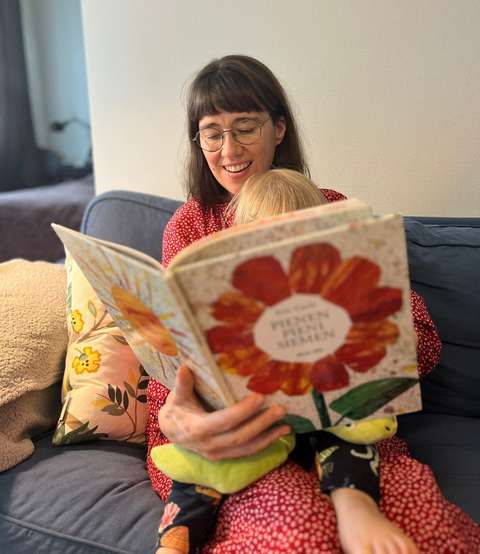Reading helps you succeed in life
Reading teaches empathy, helps you relax in your hectic daily life, and transports you to worlds you might otherwise never experience. In Espoo, there is a clear goal set for improving literacy.
Literacy and enthusiasm for books among children and young people have declined in recent years. One reason for this might be the allure of engaging and addictive social media content. According to teachers, the texts in textbooks and learning materials have become shorter, and in casual messaging, letter abbreviations are often used instead of full words.
Since reading brings joy and a wealth of benefits to people of all ages, how can we get children and young people back to books?
Anna Kilpeläinen, a special planner for the City of Espoo, lists the advantages of reading: "It promotes learning, is fun, and provides the reader with freedom. Books transport you to new worlds. Your vocabulary, grammar, and understanding of language structures develop as if by themselves."
Emotional intelligence grows when books explore matters from various perspectives. Understanding of other people and the world around us increases.
Reading also develops problem-solving skills and broadens general knowledge. All of this improves self-awareness and confidence.
“Reading has been scientifically proven to improve health and quality of life. It enhances a person’s attentiveness and ability to concentrate. At the same time, reading relaxes you in your hectic life and helps reduce stress,” says Kilpeläinen.
Talking about books is beneficial
Reading should be introduced to the daily routine of children.
Children’s parents, grandparents, and siblings can all read to them, as family reading times foster a positive attitude towards books. Looking at picture books and reading stories from an early age positively impacts a child’s reading habits and provides important moments of togetherness.
"You can invite the whole family to come together for shared reading moments. Discussing books, as well as other daily events, strengthens the relationship between children and adults and helps develop communication skills," says Kilpeläinen.
It is recommended to ask a child or young person who reads about the content and characters of the book they are reading. Teachers and libraries can provide recommendations for age-appropriate books.
Literacy is a skill like any other: improving it requires practice.
"Like learning and developing any skill, reading deserves rewards! Good reading skills help you succeed in life," says Kilpeläinen.
Espoo focuses on improving literacy
The Pisa results, which measure young people’s skills, are used as a gauge for learning. Finland’s declining Pisa results have been described by the media as almost a collapse. However, according to Harri Rinta-aho, Deputy Mayor for Growth and Learning, this is not the case, as Finland’s results are still above the OECD average.
In Espoo, Pisa results are significantly better than the Finnish average.
Literacy impacts all learning. If reading skills are weak, solving mathematical word exercises, for example, becomes impossible.
Espoo has been focusing on literacy from early childhood education onwards. Since last year, cooperation between pre-primary education and primary schools has been strengthened.
If a child has learning difficulties in pre-primary education, this information is passed on to the primary school. This allows necessary support measures to be implemented immediately, ensuring there is no interruption, according to Rinta-aho.
“Espoo’s goal is for all children to be able to read by the end of second grade of comprehensive school. From third grade onwards, learning is increasingly based on reading, in which case the child’s reading level must be adequate in relation to the requirements of third grade. If the child’s reading skills are inadequate, the child can repeat second grade. This ensures easier further learning and provides the child with a solid foundation for learning.”
One unique aspect of the school environment in Espoo is its 10,000 foreign language-speaking children. To encourage families to enrol their children in early childhood education, a change was made to the Espoo supplement included in the home care allowance. Families do not lose the supplement even if their child attends early childhood education and a parent stays home with younger siblings.
Espoo uses the funds it receives as legacies to buy books for schools, and children get to participate in selecting the books.
Efforts to improve literacy have also been made on a national level. According to the government programme, two additional hours of Finnish language lessons and one more maths lesson will be added to the lower grades. The curriculum will not be expanded, but the extra time will be used to develop basic skills.
Reading teaches empathy
Children’s books enhance the ability to empathise and develop imagination and memory.
When author Kaisa Paasto’s children were small, she found many picture books addressing emotional skills. However, there were fewer books available for slightly older children that taught friendship skills.
Paasto began writing her book series Anni Kaverinkesyttäjä, which focuses on emotional skills for 7–12-year-olds.
The children’s author highlights the development of empathy as one of the key benefits of reading. Empathy can also be learned by watching films or TV shows, but only through reading can you get inside a character’s head to explore their thoughts and put yourself in their shoes.
“Books also teach conflict resolution skills, as they present the perspectives of multiple characters. The reader understands that there are many ways to solve problems,” says Paasto.
The Prankenstein books, set in the world of pranks, deal with topics like bullying. When you get to know someone, prejudices break down, and bullying decreases. Mari Ahokoivu’s illustrations bring light-hearted humour to the books.
Kaisa Paasto compares imagination to a muscle, which needs to be exercised like any other muscle. Reading is an excellent way to do this, as books allow you to visualise everything in detail. Children and young people should be helped to find books that truly excite them. Just one enjoyable book can lead a child to the magical world of reading.
